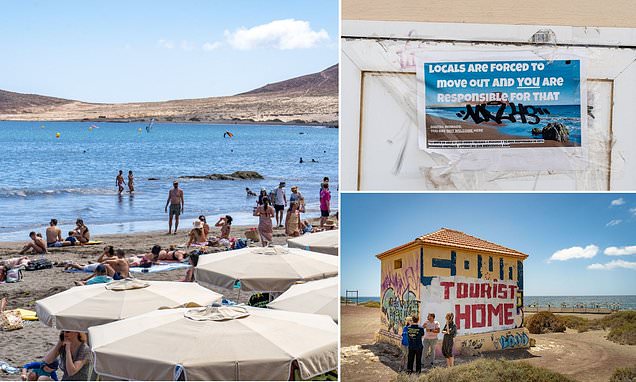
The tourism minister of the Canary Islands has urged British travellers to spend their holidays in the archipelago despite mounting protests against overtourism.
Jessica de León insisted that in spite of reports of booking cancellations and fears of holiday disruptions, ‘it is still safe to visit the Canary Islands, and we are delighted to welcome you’.
British holidaymakers have reportedly been calling hotels in Tenerife to ask if they will be safe amid a series of mass protests planned across the islands by activists unsettled by extensive arrivals of foreign holidaymakers.
Ms de León told The Telegraph that while she understood the protestors’ cause for concern, it was ‘unfair to blame tourism’ on the issues facing the Canary Islands.
Activists are now preparing for a mass demonstration on Saturday to call out the government over a deepening housing crisis across the archipelago.






While officials rally to avoid disruption ahead of the key tourist season, activists are planning protests across Tenerife, Gran Canaria, Fuerteventura, Lanzarote and La Palma to resist what they see as overtourism.
A major demonstration is planned in Arrecife, Lanzarote for tomorrow, April 20, with flyers asserting that the islands ‘have a limit’ and that protestors will be marching for ‘conservation of natural spaces, a tourist moratorium, and tougher regulation for foreigners buying property.’
The main gripe among locals is the rising costs of renting and buying homes, as landlords continue to buy up Airbnbs and tourist lets, reducing supply and pushing up prices.
Last week, activists also went on hunger strike as part of a protest against the effects of mass tourism on island life.
Nearly a dozen campaigners for a more sustainable type of tourism went ahead with their threat outside a church in the historic city of La Laguna.
The hunger strikers want the authorities to halt two tourist projects, one involving the construction of a five-star hotel by one of Tenerife’s last virgin beaches called La Tejita.
Ms de León expressed sympathy with the concerns, telling The Telegraph: ‘The problem is that the last five years have seen an average of 3,000 homes built on the islands, when demand is for 20,000.
‘Last year just 200 public housing units were built.’
Protestors attributed blame to the governance of the archipelago in their manifesto, writing: ‘If we have reached this point it is because we have no other choice and because of the serious faults that our bad Government of the Canary Islands is committing.’
‘They are putting our present and our future and that of the new generations at risk,’ they added.
‘Do not underestimate us, because we are many people. We are all of the Canary Islands, a whole movement.
‘Without our work, our votes, you are nothing and nobody and you are not for what you are doing with the Canary Islands.
‘We say enough is enough, not in our name,’ warns the manifesto, read by ‘Canarias se exhausta’ members Víctor Martín and Isora Mesa.
Tech worker Ivan Cerdeña Molina, 36, is helping organise the protest this month as part of his role at local conservation group ATAN (Asociación Tinerfeña de Amigos de la Naturaleza).
He told MailOnline previously: ‘It’s a crisis, we have to change things urgently, people are living in their cars and even in caves, and locals can’t eat, drink or live well.
‘Airbnb and Booking.com are like a cancer that is consuming the island bit by bit.
‘The benefits of the industry are not trickling down to everyday people, whose salaries have not increased in years, the quality of life here is collapsing.’
Ivan was born and raised in El Medano, a once quiet town about a 20 minute-drive east of the most popular tourist resort of Los Cristianos.




The Canary Islands have largely built their economy around tourism, welcoming around 12.3million visitors each year.
In 2023 alone, foreign travellers spent more than 20.3billion euros in the region, accounting for a fifth of spending throughout Spain.
The direct and indirect contribution of tourism to the archipelago stands at around 35 per cent.
The volcanic islands were particularly badly affected by the Covid-19 pandemic and restrictions placed on travel as a result.
The Canary Islands are the third most internationally visited region in Spain.
